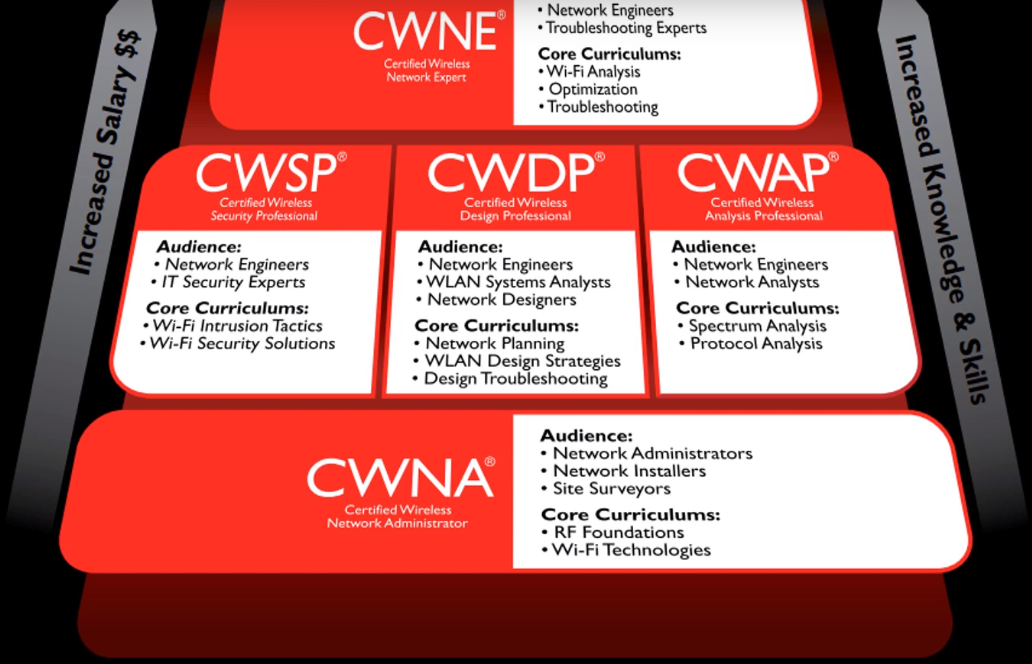At one time, Cisco set a kind of standard in the certification system of knowledge of network engineers: CCNA -> CCNP -> CCIE .
The industry liked the idea, and now every self-respecting vendor implements a similar system.
In the Wi-Fi industry, the vendor-neutral organization CWNP has taken up this issue.
In 2019, the path to success for a wireless engineer most likely looks like this:

Short:
- CWNA - the basis of everything, a very valuable course, will be useful even to experienced engineers;
- CWAP, CWDP, CWSP - an in-depth study of the relevant topics (Analysis, Design, Security), surrenders in any order after CWNA;
- CWNE = CWNA + CWAP + CWDP + CWSP + 1 media publication + 2 valid network certificates from reputable organizations + 3 qualifying essays + validated experience + recommendations.
In detail:
- CWNA: Certified Wireless Network Administrator.
This is the foundation.
Here is general knowledge on the propagation of radio waves, the basics of Wi-Fi, an understanding of the architecture of wireless networks, the necessary minimum analysis, planning and security. All this simple baggage easily fits in 1000 pages of text .
After successful completion of CWNA, you can proceed to the Professional level.
- CWAP: Certified Wireless Analysis Professional;
- CWDP: Certified Wireless Design Professional;
- CWSP: Certified Wireless Security Professional.
The content is easy to guess.
Exams can be taken in ANY sequence, the main thing is that at the time of passing the CWNA certificate remains valid.
Everything is surrendered only in person, at accredited Pearson VUE centers (in the same place as Cisco).
The certificate is valid for 3 years.
There are two ways to extend CWNA: retaking the exam itself, or receiving any of the “professional” titles: CWAP, CWDP, CWSP.
“Professional” certificates are also valid for 3 years, are renewed by passing the corresponding exam OR through participation in the optional Continuing Education (CE) program. This program implies annual deductions and the possibility of “payment” for renewal of certification with CE-points.
You can earn these points by passing vendor exams, participating in conferences, teaching and in other ways.
The highest level in the hierarchy is Certified Wireless Network Expert.
CWNE does not imply a separate exam. Instead, a number of simple requirements must be met:
- Valid certificates CWNA, CWAP, CWDP, CWSP;
- The presence of at least one solid publication in the media (article, book, regular blogging, etc.) on the subject of Wi-Fi;
- The presence of two valid certificates on network topics from reputable organizations (vendors and more);
- Preparation of three essays (500-1000 words) describing your role in the implementation of large Wi-Fi projects, with all the technical details;
- 3 years of verified experience in the Wi-Fi industry;
- 3 recommendations from respected, accessible for communication, gentlemen;
- Consent to the CWNE Code of Ethics .
Read more on the site .
The title is valid for 3 years, renewal through the aforementioned Continuing Education (CE) program.
From 01/01/2019, an application for an honorary dignity will be paid. Hurry up!
Moreover, it is very likely that in the near future an additional exam will be required: CWSA - Certified Wireless Solutions Administrator. In this article we do not consider it, since it has an indirect relation to Wi-Fi.
At the time of publication, there are 335 CWNEs worldwide.
In Russia - at least 2. Waving your hand in the comments, the country must know the heroes!
Of course, the vendor-neutral CWNP program is not the only way to get better in wireless technologies, but it was it that was universally recognized. For depth, structure and clarity.
Vendor programs are also good, but rarely updated and have a significant drawback in the form of, ahem, vendor.